Page 1 of 4
![[Policy Paper 13] The Promise of Magnetic Fusion for a Sustainable Future by Francesco Cappelletti](https://liberalforum.eu/wp-content/uploads/2022/07/Policy-Paper-13-The-Promise-of-Magnetic-Fusion-for-a-Sustainable-Future-by-Francesco-Cappelletti-214x300.jpg)
[Policy Paper 13] The Promise of Magnetic Fusion for a Sustainable Future
The ELF’s Techno-Sustainability Series is built on the assumption that technology is our ally in tackling climatic and environmental challenges. New and existing technologies are the pivotal point around which to construct the whole discussion about sustainability in Europe.
- Type: Policy Paper,
- Year: 2022
![[Policy Paper 12] Why Europe Should Stand Up for Taiwan by Werner Somers, PhD](https://liberalforum.eu/wp-content/uploads/2022/03/Policy-Paper-12-Why-Europe-Should-Stand-Up-for-Taiwan-212x300.jpg)
[Policy Paper 12] Why Europe Should Stand Up for Taiwan
The growing tensions between China and Taiwan coincide with the relationship between the US and the PRC reaching a new low.
- Type: Policy Paper,
- Year: 2022
- Language: English,
- Member: ELF Secretariat,
![[Policy Paper 11] Flexible Transnational Electoral Constituencies by [Policy Paper 11] Flexible Transnational Electoral Constituencies by Francesco Grillo, PhD and Raffaella Nanetti](https://liberalforum.eu/wp-content/uploads/2022/03/Policy-Paper-11-Flexible-Transnational-Electoral-Constituencies-212x300.jpg)
[Policy Paper 11] Flexible Transnational Electoral Constituencies
The tragic events that are shaking the world require Europeans to think of the Union’s politics as a whole, in which the common destiny of the Member States can be decided together.
- Type: Policy Paper,
- Year: 2022
- Language: English,
![[Policy Paper 10] Enhancing the Commission’s AI Act Proposal](https://liberalforum.eu/wp-content/uploads/2022/02/Screenshot-2022-02-25-08.28.39-234x300.png)
[Policy Paper 10] Enhancing the Commission’s AI Act Proposal
The Commission’s AI Act Proposal aims at deploying safer AI systems in the Internal Market. Although many welcome aspects in the Proposal contribute to it, the Proposal as it is currently drafted does not go far enough to protect fundamental rights.
- Type: Policy Paper,
- Year: 2022
- Language: English,
[Policy Paper 9] A Europe of Values
For many years, the EU has been struggling to respond adequately to rule of law violations in its own member states. With the Next Generation EU recovery funds now in the hands of governments who seem to be moving away from the democratic and liberal values of the EU, continued inaction is affecting the people’s trust in the EU project. “A Europe of Values” learns from the examples of CVM, Article 7 proceedings and inconsistencies within the EU institutions themselves to show that it is now time to move beyond dialogue towards concrete actions.
- Type: Policy Paper,
- Year: 2022
- Language: English,
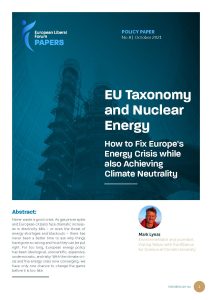
[Policy Paper 8] EU Taxonomy and Nuclear Energy: How to Fix Europe’s Energy Crisis while also Achieving Climate Neutrality
With the climate crisis and the energy crisis now converging, we have only one chance to change the game before it is too late.
- Type: ELF Papers, Policy Paper,
- Year: 2021
- Language: English,
- Member: Mark Lynas,
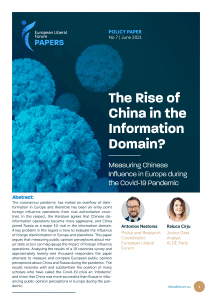
[Policy Paper 7] The Rise of China in the Information Domain?: Measuring Chinese Influence in Europe during the Covid-19 Pandemic
This paper argues that measuring public opinion perceptions about major state actors can help gauge the impact of foreign influence operations.
- Type: ELF Papers, Policy Paper,
- Year: 2021
- Language: English,
- Member: Antonios Nestoras, Raluca Cirju,
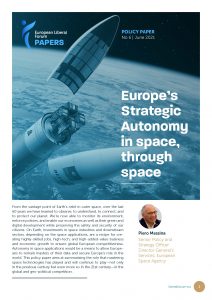
[Policy Paper 6] Europe’s Strategic Autonomy in Space, Through Space
From the vantage point of Earth’s orbit in outer space, over the last 60 years we have learned to observe, to understand, to connect, and to protect our planet.
- Type: ELF Papers, Policy Paper,
- Year: 2021
- Language: English,
- Member: Piero Messina,
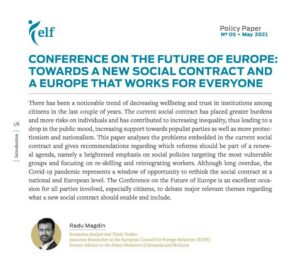
[Policy Paper 5] Conference on The Future of Europe: Towards a New Social Contract and a Europe that Works for Everyone
Year: 2021 Author: Radu Magdin ISSN: 2736-5816 DOI: 10.53121/ELFPP5 There has been a noticeable trend of decreasing well-being and trust in institutions among citizens in the last couple of years. The current social contract has placed greater burdens and more risks on individuals and has contributed to increasing inequality, thus leading to a drop in the public mood, increasing support towards […]
- Type: ELF Papers, Policy Paper,
- Year: 2021
- Language: English,
- Member: Radu Magdin,
![[Policy Paper] Towards a Social EU? Maria Alesina](https://liberalforum.eu/wp-content/uploads/2021/05/0006-212x300.jpg)
[Policy Paper 4] Towards a Social EU? A Liberal Vision for Social Policy Beyond the Porto Summit
The pandemic and subsequent economic fallout from prolonged restrictive measures are changing the socio-economic landscape across Europe, directly affecting millions of citizens.
- Type: ELF Papers, Policy Paper,
- Year: 2021
- Language: English,
- Member: Maria Alesina,
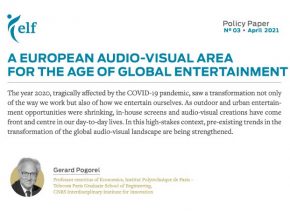
[Policy Paper 3] A European Audio-Visual Area for the Age of Global Entertainment
The year 2020, tragically affected by the COVID-19 pandemic, saw a transformation not only of the way we work but also of how we entertain ourselves.
- Type: ELF Papers, Policy Paper,
- Year: 2021
- Language: English,
- Member: Gerard Pogorel,
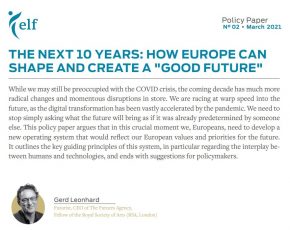
[Policy Paper 2] The Next Ten Years: How Europe Can Shape and Create a “Good Future”
This policy paper argues that in this crucial moment we, Europeans, need to develop a new operating system that would reflect our European values and priorities for the future.
- Type: ELF Papers, Policy Paper,
- Year: 2021
- Language: English,
- Member: Gerd Leonhard,
Page 1 of 4